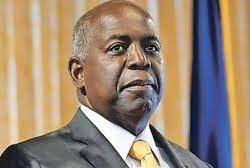
Deandre Williamson
Journal Staff Writer/United Nations RAF Fellow
Prime Minister Philip Davis called on world leaders to collectively prepare for the next
pandemic.
He made this call on Wednesday during the first United Nations High-Level Meeting on
Pandemic Preparedness and Response in New York.
“Properly investing in pandemic prevention, preparation, and response may be very expensive
— but it is surely a fraction of the cost of failing to do so,” Davis told world leaders who were
also attending the 78 th Session of the United Nations General Assembly.
“If pathogens can cross borders, then so too must solutions, innovations, technologies, and
treatments.”
According to the World Health Organization (WHO), there has been more than 700 million
confirmed cases of COVID19 and more than six million deaths as a result of the virus.
The prime minister noted that many scientists believe a new pandemic is plausible, but the world
is not ready for one.
Davis acknowledged, however, that the Pandemic Accord is an opportunity to build capacity,
collaboration, and resilience – in all countries.
Of the 41 articles in the Pandemic Accord, Davis pointed out that there are five articles which
have significant implications for Small Island Developing States: Article 9 on Research and
Development, Article 11 on Co-Development and Transfer of Technology, Article 12 on Access
and Benefit Sharing, Article 13 on Supply Chain, and Article 19 on Financing.
“These articles must explicitly include sustainable funding mechanisms, and transparent and
equitable funding allocation mechanisms – which reflect a full and fair analysis of a country’s
realities, rather than relying on misleading GDP-per-capita classifications,” he said.
“Research and Development developed with public funding must primarily serve the common
good, not short-term corporate profits. All countries need fair financing to invest in our frontline
personnel, our health care infrastructure, our surveillance capacity, and our local expertise.”
Davis told world leaders that “good intentions are nice, but binding commitments are better.
This historic United Nations High-Level Meeting on Pandemic Preparedness and Response was
welcomed by the WHO and seeks to strengthen the international cooperation, coordination,
governance and investment needed to prevent a repeat of the devastating health and
socioeconomic impact caused by COVID-19, make the world better prepared for future
pandemics, and get back on track to achieving the Sustainable Development Goals.
“The first-ever head of state summit on pandemic prevention, preparedness and response is a
historic milestone in the urgent drive to make all people of the world safer, and better protected
from the devastating impacts of pandemics,” WHO Director-General Dr. Tedros Adhanom
Ghebreyesus said.
“I welcome this commitment by world leaders to provide the political support and direction
needed so that WHO, governments and all involved can protect people’s health and take concrete
steps towards investing in local capacities, ensuring equity and supporting the global emergency
health architecture that the world needs.”


